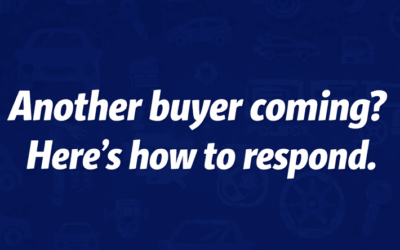Walking into a dealership can feel like stepping onto a high-pressure battlefield of negotiations. Salespeople are trained to close the deal quickly, and some will say almost anything to get you to sign on the dotted line. While many sales professionals are honest, there are common tactics designed to rush your decision or make a deal seem better than it really is.
If you’re buying a car in 2025, knowing these five common car salesperson lies can help you negotiate smarter and avoid getting taken for a ride. Don’t forget your custom Car Buying Guide to get the best deal, no matter what you’re in the market for!
“This price is only good today.”
This classic tactic creates a false sense of urgency, making you feel like you’ll lose out on a great deal if you don’t act fast. It’s meant to pressure you into making an impulsive decision before you have time to shop around or think things through.
Reality Check: While manufacturer promotions and incentives do expire, dealerships set their own pricing. If a dealer is truly motivated to sell, they’ll likely offer the same deal—or something very close to it—tomorrow, next week, or even next month. If you feel rushed, walk away and take your time.
“We’re losing money on this deal.”
Salespeople use this line to make you feel like you’re getting an unbelievable bargain. The idea is to make you hesitate to negotiate further, thinking that they’ve already cut the price as low as possible.
Reality Check: Dealerships rarely lose money on a car sale. Between manufacturer rebates, holdbacks, incentives, and extended warranties, dealers have plenty of ways to make up for any so-called ‘loss.’ They wouldn’t stay in business if they were truly selling at a loss, so don’t let this claim stop you from pushing for a better deal.
👉 Use these Car Buying Cheat Sheets to beat the dealer, EVERY time
“We’ve had a lot of interest in this vehicle, and it might be gone tomorrow.”
This tactic plays on ‘fear of missing out’ and is meant to make you feel pressured to buy before someone else does.
Reality Check: Sure, popular models do sell quickly, but unless you’re after an extremely limited or in-demand car, there’s usually another one available. A salesperson may or may not have other interested buyers, but it’s almost always an attempt to rush your decision. If you’re unsure, leave the lot and check the dealership’s online inventory later—chances are, the car will still be there.
“We paid a lot more for your trade-in than it’s really worth.”

This is a classic numbers game. By making you believe you’re getting an above-market offer on your trade-in, the dealer can justify charging more for the new car—or distract you from negotiating on financing terms.
Reality Check: Trade-in values are based on wholesale market prices, not what the dealer “paid.” Often, if a dealer offers a high trade-in value, they make up for it by adding hidden fees, increasing the price of the new car, or adjusting loan terms. Before heading to the dealership, research your trade-in’s true market value using tools like CarEdge Pro so you know what your car is really worth.
👉 Trade-In Tactics For Success (Free Guide)
“It’s got a ‘clean’ history and no known issues.”
Salespeople want to minimize concerns about a used car’s reliability. Saying a vehicle has no issues or a clean history can ease doubts and make you more likely to buy without further investigation.
Reality Check: Even if a car has no reported accidents on a Carfax or AutoCheck report, that doesn’t mean it’s problem-free. Hidden damage, flood history, or undisclosed mechanical issues could still exist.
Always get a third-party mechanical inspection (also known as a Pre-Purchase Inspection) before purchasing any used car. It’s a small price to pay to avoid thousands of dollars in unexpected repairs down the road.
👉 Stay on top of your car buying to-do list with this complete checklist!
How to protect Yourself From Car Salesperson Lies

Car dealerships use pressure tactics to speed up the sale, but with the right preparation, you stay in control. Here’s how to safeguard your purchase and maximize your savings:
Do Your Research – Know the fair market price of the car you’re considering. Use tools like CarEdge behind-the-scenes Pro to check real-time pricing and historical trends.
Take Your Time – If it’s meant to be, it’ll still be there tomorrow. Never feel pressured to buy on the spot. This is especially true of used car purchases.
Negotiate Based on the “Out-the-Door” Price – Dealers add fees, taxes, and extra costs. Always ask for a detailed breakdown of all charges. Use this free Out-the-Door Price Calculator to know what to expect.
Verify Everything – Don’t take a salesperson’s word for it. Get a vehicle history report, read the fine print, and get a pre-purchase inspection for any used car.
Be Ready to Walk Away – The best negotiating tool? Your willingness to leave. If a deal doesn’t feel right, walk away and find a dealership that respects your time and budget.
CarEdge car buying experts are ready to help you save time, a LOT of stress, AND money. Get started today with your FREE Car Buyer’s Guide!













0 Comments